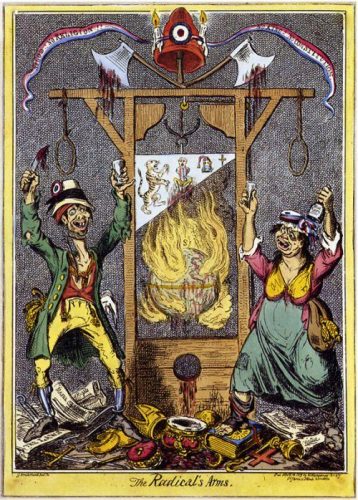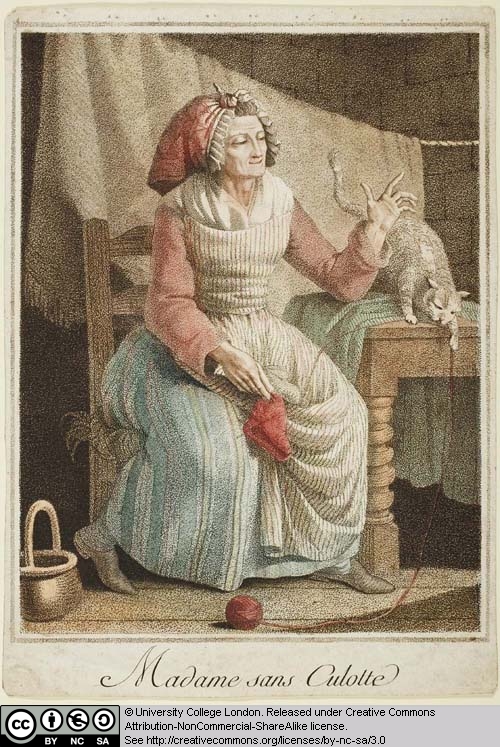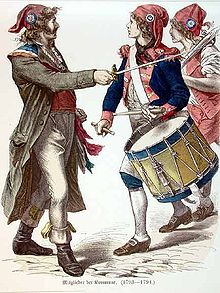Unraveling the History and Influence of the Sans-Culottes
The French Revolution, a period of radical social and political upheaval, was marked by the emergence of various factions, each vying for power and influence. Among these, the Sans-Culottes stand out as a significant force that shaped the course of the revolution. Who were the Sans-Culottes, and what was their impact on the events of that tumultuous era?

The Origins of the Sans-Culottes
The term Sans-Culottes, derived from the French for ‘without breeches,’ was initially a derogatory label used by the upper classes to describe the lower-class revolutionaries who wore trousers instead of the knee breeches typical of the aristocracy. However, the Sans-Culottes embraced this label, transforming it into a symbol of their identity and defiance against the old regime. As described by historian Georges Lefebvre, “They were the urban poor, the laborers, and the petty traders of Paris, who saw in the revolution a chance to reshape society.”
Their Role in the Revolution
The Sans-Culottes played a pivotal role in the French Revolution, particularly in the capital city of Paris. They were instrumental in the storming of the Bastille in 1789, a pivotal event that marked the beginning of the revolution. Their influence extended beyond mere participation; they were the driving force behind the radicalization of the revolution, pushing for more egalitarian reforms and the overthrow of the monarchy. As the revolution progressed, the Sans-Culottes became increasingly vocal in their demands for bread, work, and the rights of the common people.

The Influence of the Sans-Culottes
The influence of the Sans-Culottes can be seen in the various political shifts that occurred during the revolution. They were a driving force behind the rise of the Jacobins and the Reign of Terror, a period marked by the execution of thousands of perceived enemies of the revolution. Their demands for social justice and their opposition to the moderate Girondins contributed to the latter’s downfall. As a quote attributed to the revolutionary leader Maximilien Robespierre suggests, “Terror is nothing other than justice, prompt, severe, inflexible.”
“Terror is nothing other than justice, prompt, severe, inflexible.”
– Maximilien Robespierre
Legacy and Historical Significance
The legacy of the Sans-Culottes is complex and multifaceted. On one hand, they were champions of the common people, advocating for a more equitable society. On the other hand, their radicalism contributed to the violence and instability that characterized the French Revolution. Their story serves as a reminder of the power of grassroots movements to effect change, as well as the potential dangers of unchecked revolutionary fervor. As noted by historian Simon Schama, “The Sans-Culottes were the revolution’s most ardent supporters, but their vision of a classless society was ultimately as elusive as the utopias of their more moderate contemporaries.”

Conclusion
The Sans-Culottes were a diverse and influential group that played a crucial role in the French Revolution. Their actions and ideologies were instrumental in shaping the revolution’s trajectory, pushing it towards more radical outcomes. While their legacy is controversial, their impact on history is undeniable. As we reflect on their story, it is essential to consider the broader implications of their struggle for a more just and equal society.








The article’s discussion of the Sans-Culottes’ role in the storming of the Bastille is well-articulated. It captures the dramatic and decisive nature of their actions, which set the stage for the revolution’s radical turn. This event is a key moment in understanding their impact.
The quote from Robespierre about terror being justice is chilling. It underscores the moral complexities of revolutionary movements. While the Sans-Culottes’ intentions were noble, their methods were often brutal. This duality is well captured in the article.
As a student of political science, I found the section on the Sans-Culottes’ influence on political shifts particularly enlightening. The connection between their demands and the rise of the Jacobins is well-explained, providing valuable insights into the dynamics of revolutionary politics.
As a historian of the French Revolution, I appreciate the article’s focus on the Sans-Culottes’ role in the radicalization of the revolution. Their influence on the Jacobins and the Reign of Terror cannot be overstated. However, the article could benefit from a more nuanced discussion of the ethical implications of their actions, particularly in light of the widespread executions during the Reign of Terror.
I’m a college student majoring in history. The article’s analysis of the Sans-Culottes’ role in the revolution was very thorough. I particularly liked the quote from Robespierre; it really encapsulates the radical mindset of the time.
The article’s use of quotes from historians like Georges Lefebvre and Simon Schama adds depth and credibility. However, I would have liked to see more primary sources, such as letters or speeches by the Sans-Culottes themselves. This would provide a more direct connection to their voices and experiences.
As a teacher of history, I found the article to be a valuable resource for students. The clear structure and detailed analysis make it accessible to a wide audience. However, I would encourage the author to include more discussion of the Sans-Culottes’ relationship with other revolutionary groups, such as the Jacobins and the Girondins, to provide a more complete picture of their role in the revolution.
The article’s discussion of the Sans-Culottes’ radicalization of the revolution is compelling. It illustrates how their demands for more egalitarian reforms pushed the revolution towards more extreme outcomes. This dynamic is often overlooked in historical accounts.
As a historian, I found the article to be a comprehensive overview of the Sans-Culottes’ role in the French Revolution. The detailed analysis of their origins, actions, and legacy provides a clear picture of their significance. However, I would have appreciated more nuanced discussion on the ethical implications of their radicalism.
I appreciate the article’s focus on the Sans-Culottes’ egalitarian demands and their push for social justice. However, I feel that the article could have delved deeper into the complexities of their radicalism and the resulting violence. The Reign of Terror, while mentioned, could have been explored more thoroughly to understand its full impact.
I’m a retiree who has always been interested in history. The article’s focus on the Sans-Culottes’ legacy was particularly poignant. It’s a reminder that even the most well-intentioned movements can have unintended consequences.
As a woman who has studied the French Revolution extensively, I appreciate the article’s focus on the Sans-Culottes’ role in radicalizing the movement. However, I would have liked to see more about the role of women within this group, as they were also significant participants.
As a parent, I appreciate the article’s educational value. It’s a great way to introduce young people to the complexities of the French Revolution. The discussion of the Sans-Culottes’ impact on the Reign of Terror is especially thought-provoking.